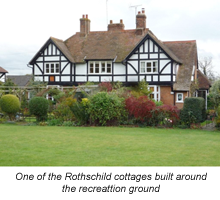
Wingrave – a brief historical outline
Wingrave originally consisted of two settlements – a nucleated village of farm and agricultural buildings around the Parish Church and the small settlement of Nup End a short distance to the north east of the Church. Over many centuries, Wingrave was a fairly isolated farming village and in addition to the Church, there are 27 listed buildings, of which around twelve are 17th century or earlier. Most of these early buildings were farmhouses but are now private houses.
 An
important change occurred in 1875, when Hannah de Rothschild purchased two
hundred acres of farmland and seventeen cottages in and around the village.
One of these is pictured here. Hannah was born in 1851 and was four years old
when her father Mayer Amschel Rothschild moved into Mentmore Towers; as the
only child, she inherited the estate of two million pounds and 4,500 acres
when her father died in 1874. From 1875 onwards Hannah (later to marry the
Earl of Roseberry) remodeled much of Wingrave, building new cottages around
the recreation ground and in Nup End, and in 1877 providing a purpose built
reading room and infants’
school. A Manor House was also constructed in about 1870 to 1880, probably
by the Rothschilds. Many of the Rothschild cottages have subsequently been
listed.
An
important change occurred in 1875, when Hannah de Rothschild purchased two
hundred acres of farmland and seventeen cottages in and around the village.
One of these is pictured here. Hannah was born in 1851 and was four years old
when her father Mayer Amschel Rothschild moved into Mentmore Towers; as the
only child, she inherited the estate of two million pounds and 4,500 acres
when her father died in 1874. From 1875 onwards Hannah (later to marry the
Earl of Roseberry) remodeled much of Wingrave, building new cottages around
the recreation ground and in Nup End, and in 1877 providing a purpose built
reading room and infants’
school. A Manor House was also constructed in about 1870 to 1880, probably
by the Rothschilds. Many of the Rothschild cottages have subsequently been
listed.
In the 20th century, Wingrave experienced ribbon development along the main village roads, and subsequently infilling and new estate developments between the village and the A418 Aylesbury Road. The population of the parish in the 2001 census is about 1500.
Two books have been written about Wingrave by Ken and Margaret Morley: "The Great Upheaval" and "Wingrave: a Rothschild Village in the Vale"